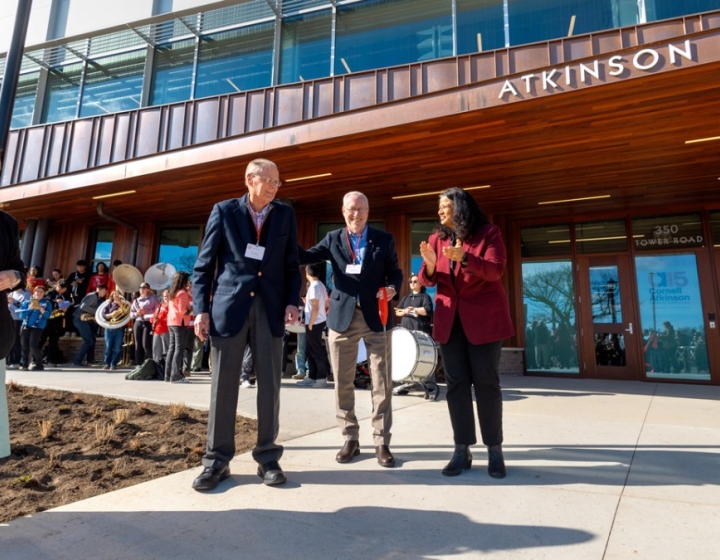Cornell public health program models learning triad
The Cornell Master of Public Health (M.P.H.) Program has documented new benefits to its integrative training model. Program leaders published a paper describing their novel approach to public health training — and how a learning triad among community partners, students and faculty has organically emerged.
“Other types of education programs employ similar models, but public health education has been left out of the conversation,” says Gen Meredith, associate director of the program, which recently achieved full accreditation.
The paper, published in the Michigan Journal of Community Service Learning, outlines the benefits emerging from an iterative, flexible learning model. By incorporating projects with and for real-world businesses and non-profits into class-based learning, students build hard skills like data collection and analysis and soft skills like leadership and communication; their community partners gain valuable service and learn more about public health; and faculty members enrich their research and mentorship activities. Simultaneously, this approach builds relationships, and the program strengthens projects that benefit public health in local communities and work toward structural changes to societal issues.
“We became interested in the type of learning that happens for community partners during this relationship,” says Meredith. “So we looked at what kind of knowledge and skills community partners were interested in gaining, and saw how this overlapped with what we are also trying to help students learn in the classroom.”
The Cornell program has partnered with more than 20 community partners since its creation in 2016, using the university’s land-grant mission — and groups like Engaged Cornell and the Center for Teaching Innovation — to fully embrace community-engaged, immersive learning experiences for all three groups in the triad.
“We hope our continued research in this area will help elucidate the real and quantified benefit that M.P.H. programs bring to the workforce through an investment in this type of learning,” says Meredith.
Community partners are consequently a crucial part of the model. Baz Perry ’02, equitable food systems coordinator for the Cornell Cooperative Extension (CCE) of Tompkins County, facilitates Cornell’s involvement in the produce prescription program in Tompkins, a partnership that started in 2018. The program connects eligible patients who have diet-related illnesses like diabetes and hypertension with fresh, organic food every week from June through mid-November.
Students and faculty in the M.P.H. program have been working to help Perry ensure their processes and outcomes meet the high standards required to keep the produce prescription program running well. “We are transparent with them about our current program implementation and what our goals are,” she says. “They then are able to give us fresh insight and analysis into how to improve our processes and, therefore, our outcomes.” Through this exchange, they make improvements and share the experience of implementing those improvements. “This is how they [the M.P.H. students] learn about budget and personnel limitations, and how different public health strategies are able to be implemented in a real-world setting with its diversity of cultures, opinions and anything else that can make a strategy work or need revision along the way,” says Perry. “It’s an iterative dialogue.”
“Learning is happening in multiple directions,” adds Meredith, “which leads to this kind of collective capacity-building of knowledge and skills. Over time you see these relationships are not one-off. Most of what we’re working on are growing into multi-year projects with many branches and offshoots.”
Lara Parrilla ’99 has seen different iterations of projects from both the partner and faculty perspectives. Parrilla is the former nutrition and community development issue leader of CCE Tompkins County and joined the M.P.H. team as a visiting lecturer last semester. Since the start of the program, Parrilla has contributed to course planning and project ideas. In her current role she’s continuing to supervise student groups as a faculty mentor, and still serves as the lead for the program’s involvement with Cayuga Health Partners.
“I think the most important thing that is happening between the program and community partners is a very organic capacity-building of professional development for staff,” says Parrilla.
Moreover, layered involvement like Parrilla’s builds trust, which is a foundation of the M.P.H. Program’s model.
“We call for a meaningful trust-building relationship and commitment to try to change the status quo,” says Meredith. “If we came in and said to a community partner, ‘This is how you should run things,’ as public health experts we know that approach is likely to fail. You work with partners to understand what is needed and if or how you can add value.”
Such trust is especially vital now as the country responds to the coronavirus pandemic. M.P.H students, staff and faculty are building on these relationships and are working with the Ithaca City School District, for example, on an updated emergency response and food security plan, and even envision building on their long-standing relationship with the Tompkins County Health Department to help design communication strategies for hard-to-reach populations as potential testing or vaccine campaigns for COVID-19 emerge.
Says Meredith, “Now more than ever, we can see the importance of an all-hands-on-deck approach to public health.”
Audrey Baker ’09, M.P.A. ’15, manager of applied learning and evaluation, and Dr. Amie Patchen, postdoctoral associate, are co-authors on the study.
By Melanie Greaver Cordova





